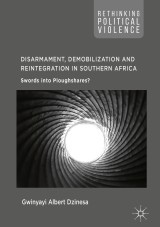Details

Disarmament, Demobilization and Reintegration in Southern Africa
Swords into Ploughshares?Rethinking Political Violence
|
53,49 € |
|
| Verlag: | Palgrave Macmillan |
| Format: | |
| Veröffentl.: | 24.08.2017 |
| ISBN/EAN: | 9783319605494 |
| Sprache: | englisch |
Dieses eBook enthält ein Wasserzeichen.
Beschreibungen
<p>This book is a critical comparative reflection of the post-colonial conflict Disarmament, Demobilization and Reintegration (DDR) of ex-combatants in Zimbabwe, Namibia and South Africa. It offers an up-to-date comparative analysis of how specific analytical elements that transcend state boundaries shaped DDR in the three southern African countries. The author explores structural and organizational frameworks, target groups, state leadership in DDR, linkages between DDR and SSR in nation and state building, and types of post-conflict violence. The volume draws on fieldwork including interviews with policy makers and government officials as well as ex-combatants and experts to provide valuable insights into how post-colonial conflict DDR can provide knowledge crucial to understanding and addressing the problems of post-conflict peace building in Africa. The book is aimed at academics<b>, </b>researchers and students working on Southern Africa; African and Western policymakers concernedwith problematic post-conflict situations on the continent, where improvising DDR processes will be vital to success; as well as<b> </b>the general reader interested in political, security and other developments in the region. It will be of use in postgraduate courses in the inter-related fields of international relations, comparative government, conflict resolution and peacebuilding. </p>
<p>Chapter 1: Introduction.- Chapter 2: Conceptualizing Disarmament, Demobilization and Reintegration Processes.- Chapter 3: Zimbabwe: DDR by Trial and Error.- Chapter 4: Namibia: Creating a time bomb.- Chapter 5: South Africa: Demobilization into the cold.-Chapter 6: Conclusion. </p>
<p>Gwinyayi A. Dzinesa is a freelance researcher and writer. Previously, he was a Senior Researcher at the Institute for Security Studies and Centre for Conflict Resolution in South Africa and has taught at Rhodes and Wits Universities. Gwinyayi is co-editor of <i>Peacebuilding, Power and Politics in Africa </i>(2012) and<i> Region Building in Southern Africa</i> (2012).</p>
<p>This book is a critical comparative reflection of the post-colonial conflict Disarmament, Demobilization and Reintegration (DDR) of ex-combatants in Zimbabwe, Namibia and South Africa. It offers an up-to-date comparative analysis of how specific analytical elements that transcend state boundaries shaped DDR in the three southern African countries. The author explores structural and organizational frameworks, target groups, state leadership in DDR, linkages between DDR and SSR in nation and state building, and types of post-conflict violence. The volume draws on fieldwork including interviews with policy makers and government officials as well as ex-combatants and experts to provide valuable insights into how post-colonial conflict DDR can provide knowledge crucial to understanding and addressing the problems of post-conflict peace building in Africa. The book is aimed at academics<b>, </b>researchers and students working on Southern Africa; African and Western policymakers concernedwith problematic post-conflict situations on the continent, where improvising DDR processes will be vital to success; as well as<b> </b>the general reader interested in political, security and other developments in the region. It will be of use in postgraduate courses in the inter-related fields of international relations, comparative government, conflict resolution and peacebuilding. </p>
Only up-to-date study of the three ‘first generation’ DDR cases of southern Africa Broadens the conceptual terrain and moves beyond the World Bank-UN-NGO driven literature on DDR Draws on fieldwork including interviews with policy makers and government officials that are often difficult to access as well as ex-combatants and experts
<p>Only up-to-date study of the three ‘first generation’ DDR cases of southern Africa</p> <p>Broadens the conceptual terrain and moves beyond the World Bank-UN-NGO driven literature on DDR</p> <p>Draws on fieldwork including interviews with policy makers and government officials that are often difficult to access as well as ex-combatants and experts</p>
Diese Produkte könnten Sie auch interessieren:

How Insights from Moral Psychology and Character Research can aid Development Cooperation

von: Jan Prothmann

13,99 €
















